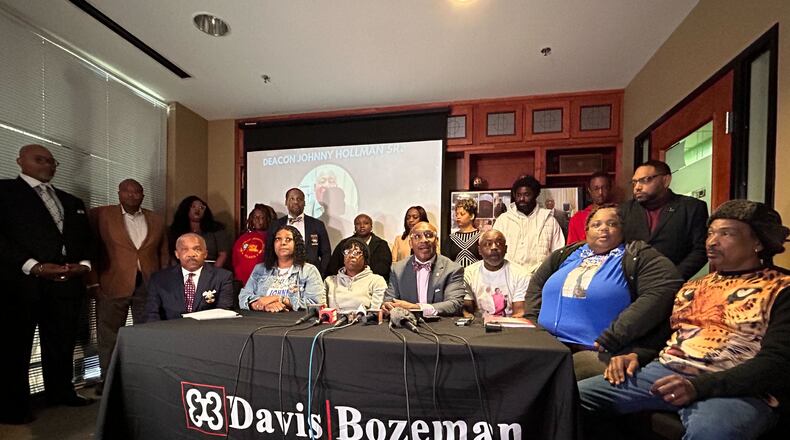The family of Johnny Hollman, a 62-year-old church deacon who died while being arrested after a minor car crash in Atlanta in August, said they are one step closer to justice after filing a civil lawsuit.
Attorneys said they filed the lawsuit Thursday in federal court lodging civil rights claims against the City of Atlanta, police Chief Darin Schierbaum and former Officer Kiran Kimbrough related to Hollman’s death.
“Last night I was thinking about this, and I was getting angry and upset because I know what they’re going to put this family through,” family attorney Mawuli Davis said, explaining that civil rights cases typically take 4-6 years.
Before filing the lawsuit, Davis said his firm followed standard practice and informed the city government of their intent to sue, which provided officials with a chance to settle out of court. City officials did not respond, according to Davis.
“But I’m not mad, I’m grateful that the City of Atlanta didn’t reply to our complaint,” Davis continued, adding that he saw the case as an opportunity for long-term reform in the Atlanta Police Department.
Hollman became unresponsive after being stunned with a Taser and put into handcuffs by Kimbrough following a crash Aug. 10 in southwest Atlanta. The GBI described Hollman as “non-compliant” and said he refused to sign a ticket. Davis argues that Hollman was not refusing to sign the citation, but only trying to explain to the officer what led to the crash.
Body camera footage released in November by Atlanta police shows the entire encounter. At one point, Kimbrough can be seen grabbing Hollman’s arm while repeating, “Sign the ticket.” Hollman replies with, “OK. I’m going to sign the ticket.” Kimbrough then appears to force Hollman to the ground, before stating that he would use his Taser.
Hollman can then be heard repeating, “I can’t breathe.” The struggle continues for only a few more seconds and then Hollman appears to fall unconscious, the video shows.
Hollman’s official cause of death is listed as “cardiac dysrhythmia due to use of (a Taser) in association with hypertensive and atherosclerotic cardiovascular disease,” according to the autopsy report. He also had underlying conditions such as chronic obstructive pulmonary disease, diabetes and obesity, which the medical examiner determined contributed to his death.
Thursday’s lawsuit accuses the defendants of violating the Fourth Amendment by using excessive force, violating Hollman’s First Amendment right through physical retaliation, failing to provide him with medical care, physically restraining him and ultimately leading to his “wrongful death.”
“While we call this lawsuit a violation of deacon Hollman’s civil rights, when you really distill all of this down to its essence and you look at the body-worn camera video footage that we’ve now all seen, this amounts to a disrespect and a disregard to deacon Hollman’s humanity,” said attorney Harold Spence, a partner of the Davis Bozeman Law firm.
Editor’s note: The following video contains disturbing images and language. Viewer discretion is advised. This video is only a portion of the body camera footage released. Moments after the video clip ends, Hollman is shown unresponsive.
Credit: Atlanta Police Department
Davis framed the suit as one aspect of a larger protest movement against the use of excessive force and a dismantling of policing culture in Atlanta.
The lawsuit alleges the city utilized an unconstitutional policy that allowed citizens to be arrested for refusing to sign traffic citations. The department changed that policy after Hollman’s death, instructing officers not to arrest drivers who refuse to sign citations. Going forward, officers will simply write “refusal to sign” on the ticket.
The lawsuit also claims that there is a “deliberate indifference to widespread pattern and practice of excessive force” within the department. According to the lawsuit, there were 1,274 incidents of non-deadly force reported by Atlanta police officers between 2017 and 2020, and 95% of those were not further investigated and no disciplinary action was taken.
“What the City of Atlanta does often in instances where officers have been accused — credibly accused — of employing excessive force against a citizen, they have a playbook that they use,” Spence said. “Often they conduct a cursory investigation, sometimes they conduct no investigation at all, and other times if they do conduct an investigation, instead of finding the officer guilty of employing excessive force, they find the officer guilty of some other administrative type of violation.
“That was reflected in this instance. This was straight out of the City of Atlanta’s playbook.”
In early October, the department announced that Kimbrough had been fired for reportedly failing to follow the department’s standard operating procedures while trying to arrest Hollman. According to the department, the officer should have called a supervisor to the scene before arresting the deacon for refusing to sign the ticket.
Davis credited Kimbrough’s firing to the work of activists who “stayed in the streets” and spoke out against Hollman’s treatment and death.
For Hollman’s oldest daughter, Arnitra Fallins, the lawsuit symbolizes a possibility of peace, but she said there is still a long way to go. For the past five months, she said she hasn’t gone a day without thinking of her father, hearing his voice and wishing she could have done something to save him.
“We gotta live with this for the rest of our lives. The City of Atlanta, it’s going to move on. The mayor is going to move on. The chief is going to move on. But we are stuck in this narrative. This is our reality,” Fallins said.
The Atlanta Police Department and mayor’s office, when asked for a statement on the lawsuit, stated they do not comment on pending litigation, but a spokesperson said “the Hollman family remains in the mayor’s prayers.”
— Staff writer Henri Hollis contributed to this article.
About the Author
Keep Reading
The Latest
Featured




